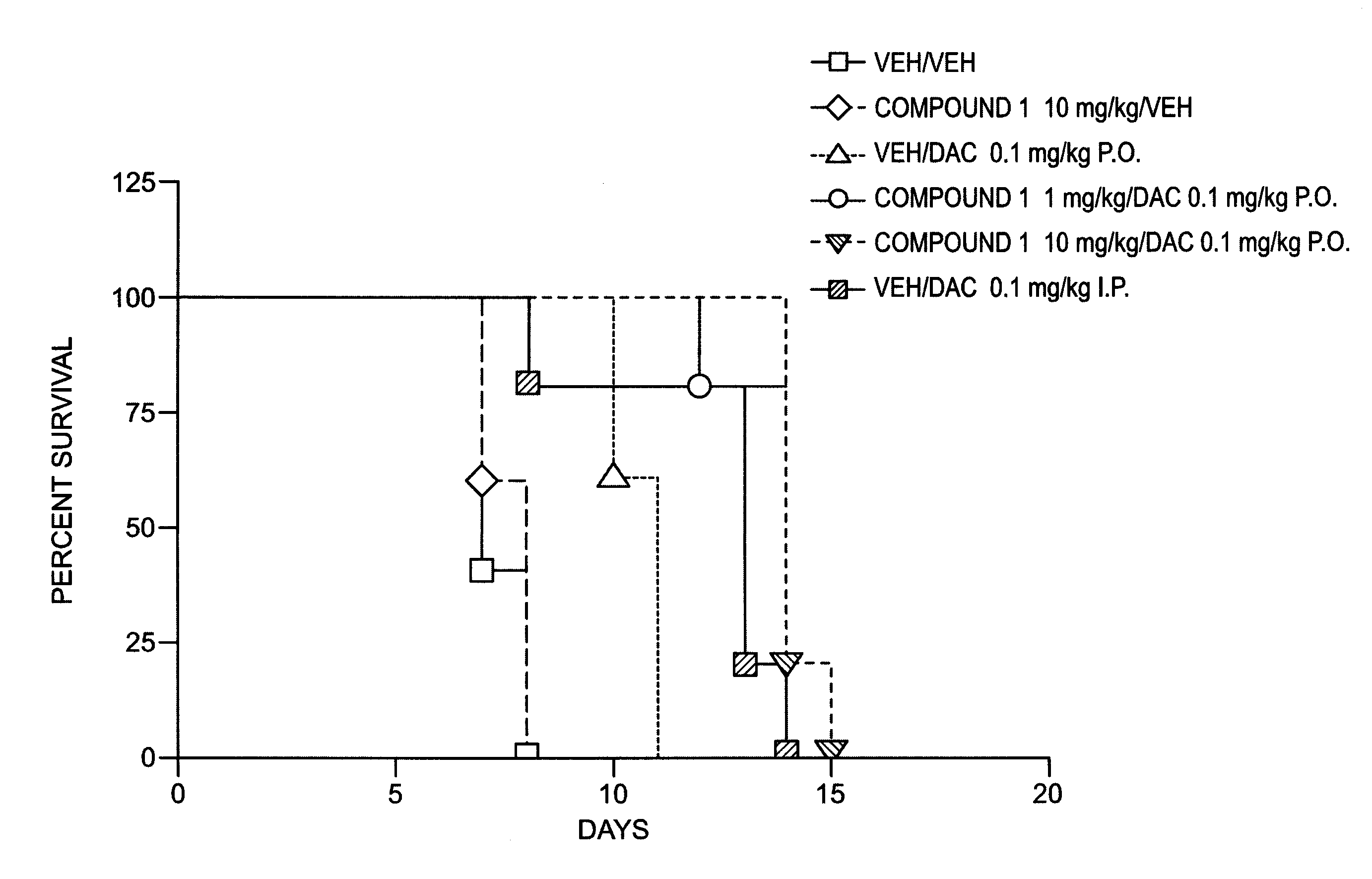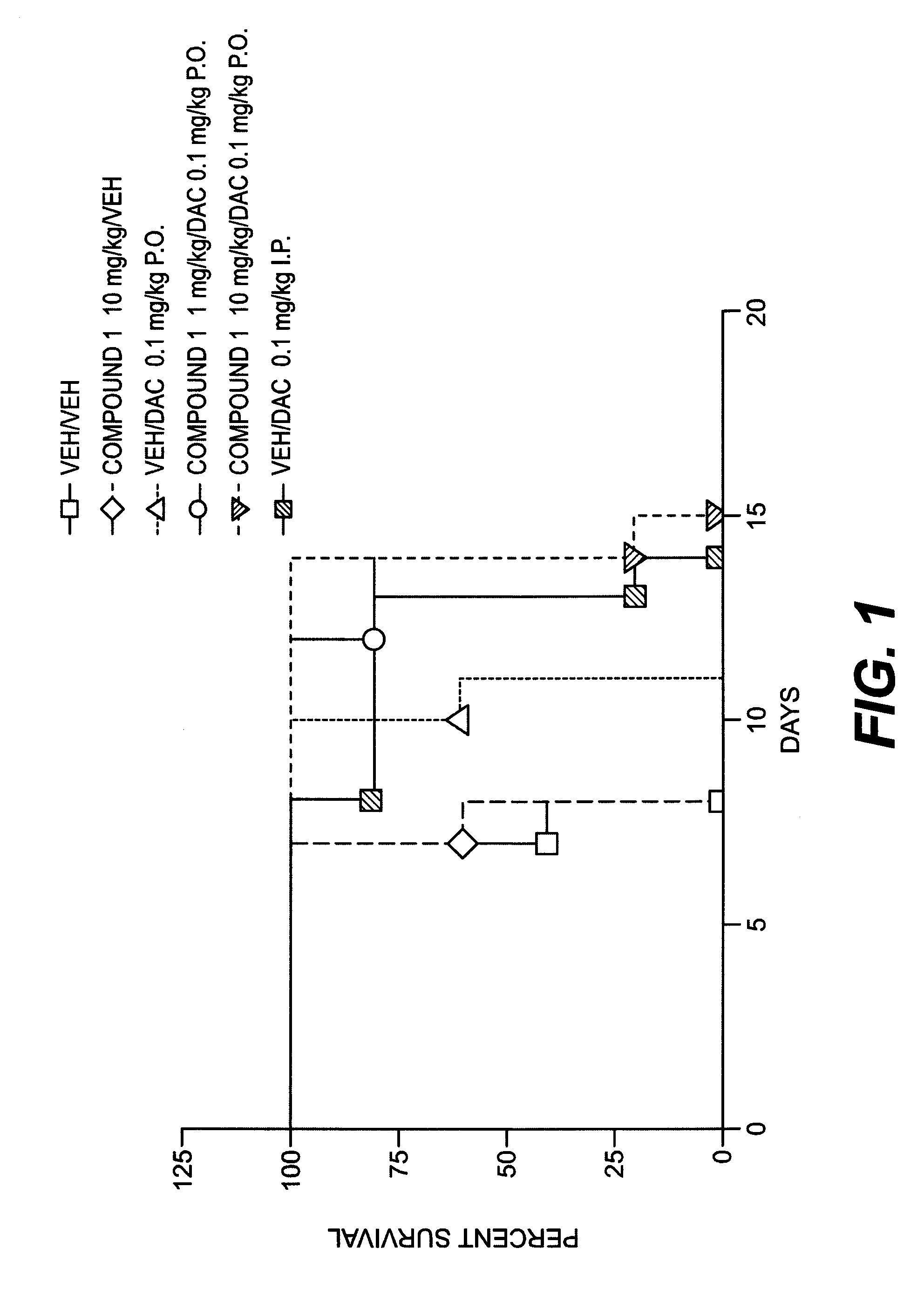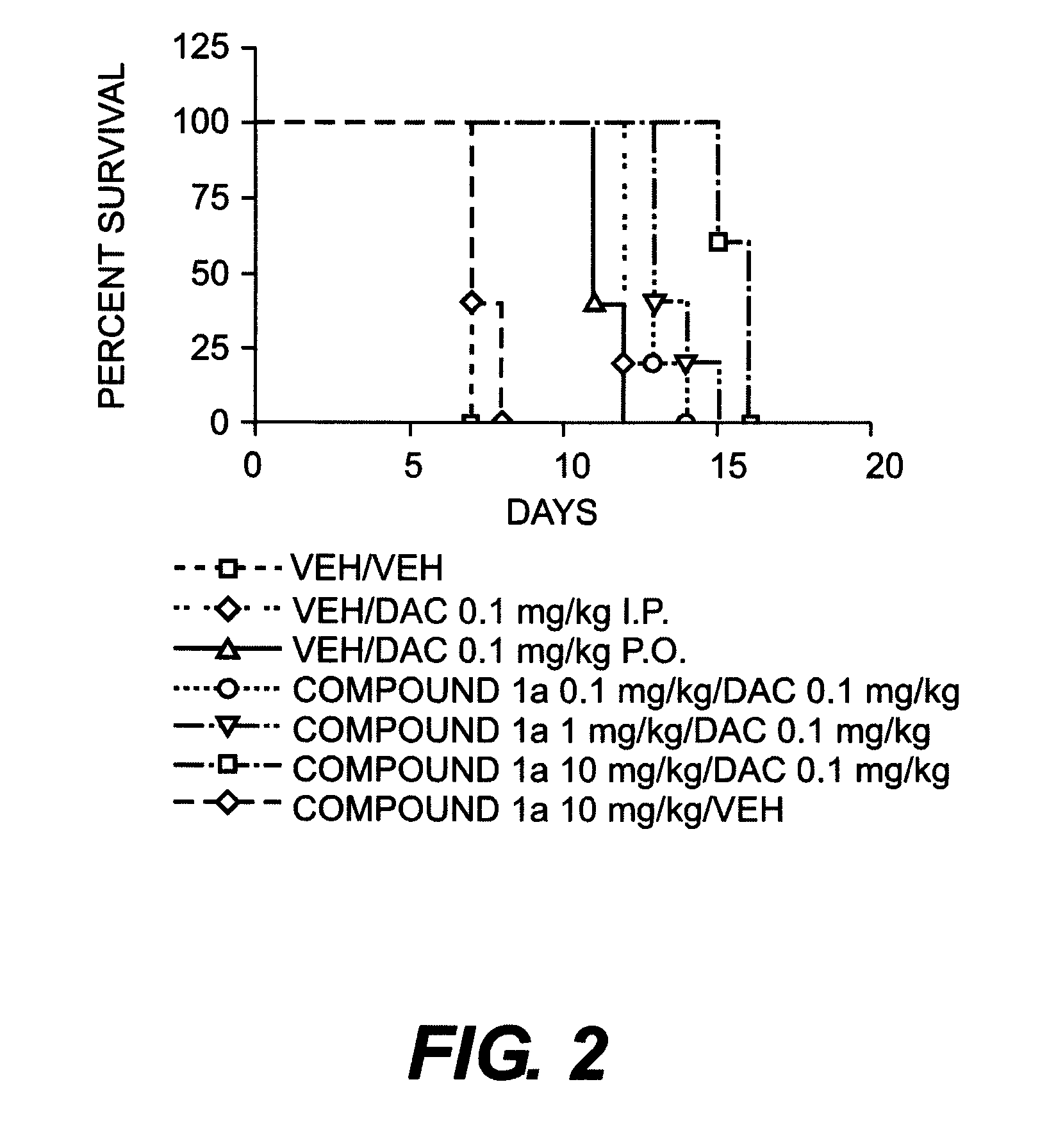Certain Compounds, Compositions and Methods
a technology of tetrahydrouridine and derivative compounds, applied in the field of tetrahydrouridine derivative compounds, can solve the problems of cda inhibitors such as thu, limited oral bioavailability and efficacy, and loss of therapeutic activity of uridine derivatives, so as to improve the half-life, bioavailability and/or efficacy, and improve the effect of aqueous solubility, drug absorption and toxicity levels
- Summary
- Abstract
- Description
- Claims
- Application Information
AI Technical Summary
Benefits of technology
Problems solved by technology
Method used
Image
Examples
example 1
[0197]
2′2′-DiFluoro-DiHydro-Uridine (DFDHU, 25). Gemcitabine 24 (3.0 g, 11.4 mmol) is dissolved in H2O (50 mL). Rhodium on alumina (900 mg) is added to the solution and the mixture is hydrogenated overnight at 40 psi. The next day, the mixture is filtered, the water is removed in vacuo and the resulting sticky solid is dissolved in H2O again. Rhodium on alumina is added to the solution (900 mg) and the material is hydrogenated overnight at 40 psi. The rhodium is filtered off and the resulting filtrate is concentrated to afford a crude mixture of difluorodihydrouridine (5, DFDHU) and ˜10% of difluorotetrahydrouridine 1a and 1b (DFTHU). The crude mixture is purified on reverse phase HPLC (reverse phase C18@5% CH3CN / H2O) to afford 1.84 g (61%, 14.5 minutes) of DFDHU 25 and 175 mg (17%, 1a, 9.5 minutes and 1b, 13.9 minutes) of the epimers of DFTHU. The absolute configuration of C-4 for compound 1a is determined by single crystal X-ray diffraction, and is consistent with literature prece...
example 2
[0201]
2′(R)-Fluoro-2′deoxy-DiHydroUridine [(R)-FDHU, 28]. 2′-Fluoro-2′-deoxyuridine 27 (1.2 g, 4.9 mmol) is dissolved in H2O (30 mL) with a few drops of concentrated ammonium hydroxide (5 drops). Rhodium on alumina (300 mg) is added to the solution and the mixture is hydrogenated overnight at 40 psi. The next day, the mixture is filtered and the filtrate is concentrated and purified via prep HPLC (reverse phase C18@5% CH3CN / H2O). The major product is 28, (R)-FDHU, which elutes at 9.2 minutes (780 mg, 64%). Some residual starting material 7a (5.5 minutes, 95 mg, 8%) and a minor amount of the FTHU 2a and 2b (7.2 minutes, 50 mg, 4% and 8.6 minutes, 45 mg, 4%) are isolated. 1HNMR 28 (D2O): 5.83 (dd, 1H), 5.07 (dd, 1H), 4.18 (q, 1H), 3.90-3.78 (m, 2H), 3.65 (dt, 1H), 3.52-3.35 (m, 2H), 2.64 (t, 2H).
2′(R)-Fluoro-2′-deoxy-TetraHydroUridine ((R)-FTHU, 2a and 2b). The (R)-FDHU (600 mg, 2.4 mmol) is dissolved in 20 mL of MeOH and cooled to 0° C. Sodium borohydride (355 mg, 9.6 mmol) is added ...
example 3
[0205]
2′(S)-fluoro-2′deoxy-dihydrouridine [(S)-FDHU, 31]. Compound 30 (1.2 g, 4.0 mmol) is dissolved in H2O (40 mL). Rhodium on alumina (200 mg) is added to the solution and the mixture is hydrogenated overnight at 50 psi. The next day, the mixture is filtered through a pad of celite and concentrated in vacuo. The desired product 31 is obtained in quantitative yield (>1.0 g). 1HNMR (D2O): 6.08 (dd, 1H), 5.09 (dt, 1H), 4.28 (m, 1H), 3.85-3.80 (m, 2H), 3.72 (m, 2H), 3.51 (m, 1H), 2.65 (t, J=9 Hz, 2H).
2′(S)-fluoro-2′deoxy-tetrahydrouridine [(S)-FTHU, 3a and 3b]. Compound 31 (1.12 mg, 4.55 mmol) is dissolved in 28 mL of MeOH and cooled to 0° C. Sodium borohydride (475 mg, 12.55 mmol) is added portion-wise to the solution and the reaction is allowed to continue for 1 hour and 15 minutes. The MeOH is removed in vacuo and the residue is dissolved in 15 mL of 5% CH3CN / H2O. The solution is neutralized with 2.0 N HCl to pH 7 (˜3 ml). The solution is then purified via prep HPLC (reverse phase ...
PUM
| Property | Measurement | Unit |
|---|---|---|
| Composition | aaaaa | aaaaa |
| Degradation properties | aaaaa | aaaaa |
Abstract
Description
Claims
Application Information
 Login to View More
Login to View More - R&D
- Intellectual Property
- Life Sciences
- Materials
- Tech Scout
- Unparalleled Data Quality
- Higher Quality Content
- 60% Fewer Hallucinations
Browse by: Latest US Patents, China's latest patents, Technical Efficacy Thesaurus, Application Domain, Technology Topic, Popular Technical Reports.
© 2025 PatSnap. All rights reserved.Legal|Privacy policy|Modern Slavery Act Transparency Statement|Sitemap|About US| Contact US: help@patsnap.com



